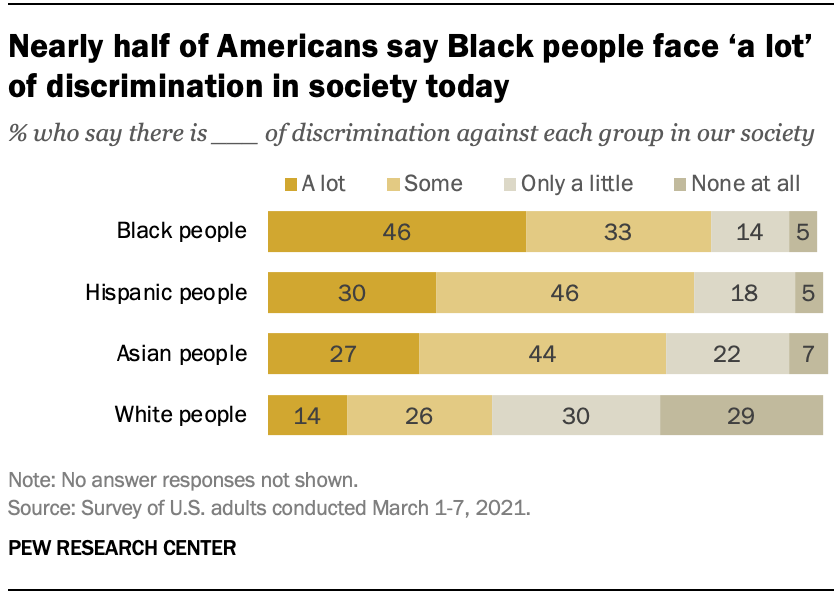
Large shares of Americans say there is at least some discrimination against several groups in the United States, including 80% who say there is a lot of or some discrimination against Black people, 76% who say this about Hispanic people and 70% who see discrimination against Asian people.

Nearly half of Americans (46%) say there is “a lot” of discrimination against Black people. About three-in-ten see a lot of discrimination against Hispanic people (30%) and Asian people (27%).
Americans are much less likely to say there is discrimination against White people: 40% say White people face at least some discrimination, and just 14% say White people face a lot of discrimination, according to a Pew Research Center survey conducted March 1-7, 2021.
The survey was fielded before the March 16 Atlanta-area shootings in which six of the eight victims were Asian women. Also, these questions ask Americans about their perceptions of discrimination against groups of people rather than about violence or individuals’ personal experiences with discrimination or violence; see “How we did this” for additional resources on those subjects.
How we did thisTo assess public perceptions of discrimination against various groups of people in the U.S., Pew Research Center surveyed 12,055 U.S. adults March 1-7, 2021.
The survey was fielded both before President Joe Biden’s March 10 address, in which he called attention to and condemned a rise in violence against Asian Americans and before the March 16 mass shootings in the Atlanta area in which seven women – six of whom were Asian women – and one man were killed by a White man.
This question is designed to ask about perceptions of discrimination, which can – and often do – contrast with measures of individuals’ experiences of discrimination. While views of discrimination may be related to views about violence against groups, these are also different questions.
Everyone who took part in this survey is a member of Pew Research Center’s American Trends Panel (ATP), an online survey panel that is recruited through national, random sampling of residential addresses. This way nearly all U.S. adults have a chance of selection. The survey is weighted to be representative of the U.S. adult population by gender, race, ethnicity, partisan affiliation, education and other categories. Read more about the ATP’s methodology.
Here are the questions used for the report, along with responses, and its methodology.
Views of discrimination against racial and ethnic groups vary widely by race and ethnicity, as well as along partisan lines.
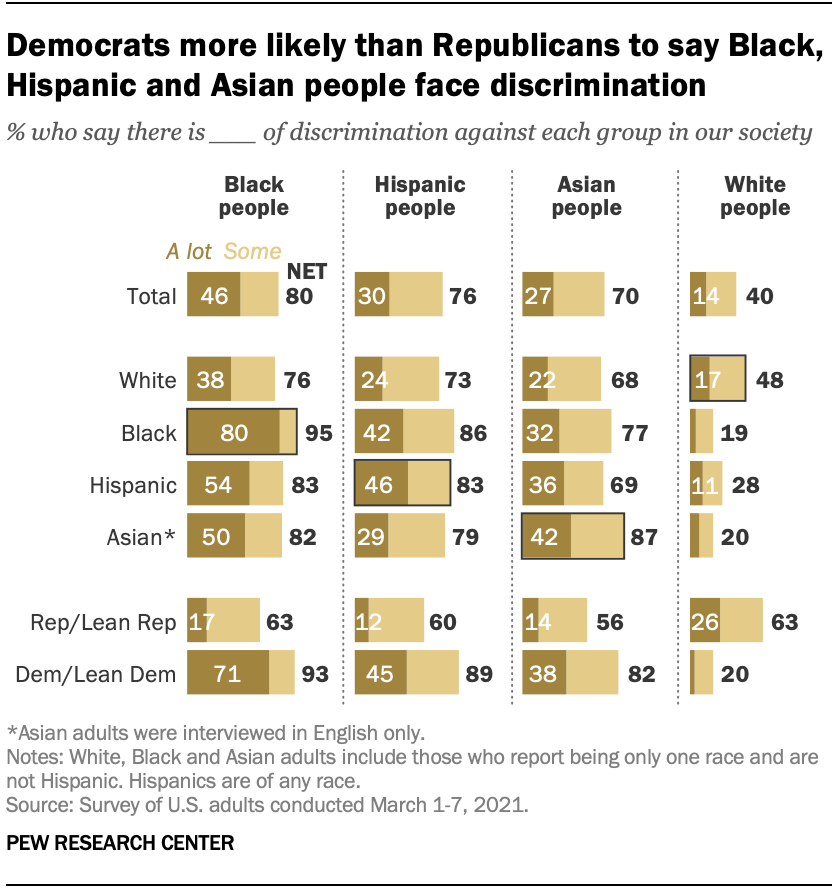
While large majorities of White, Hispanic and Asian American adults all say that Black people face at least some discrimination, Black Americans are far more likely to say that Black people face a lot of discrimination. Eight-in-ten Black adults say this, as do 54% of Hispanic adults, half of Asian adults and 38% of White adults. And almost all Black adults (95%) say that Black people face at least some discrimination.
Black adults and Hispanic adults are about equally likely to say there is a lot of discrimination against Hispanic people, while White and Asian adults are substantially less likely to say this.
Sizable majorities across racial and ethnic groups say Asian people face at least some discrimination; 42% of Asian Americans say that Asian people face a lot of discrimination. By comparison, 36% of Hispanic people, 32% of Black people and 22% of White people say the same.
White adults are by far the most likely to say that White people face at least some discrimination in our society: About half (48%) say this. Those in other racial and ethnic groups are much less likely to say White people face discrimination (28% of Hispanic adults say this, as do about two-in-ten Black and Asian adults).
Democrats and Democratic-leaning independents are far more likely than Republicans and Republican leaners to say that Black people, Hispanic people and Asian people face a lot of discrimination, and far less likely than Republicans to say that White people face discrimination.
About seven-in-ten Democrats (71%), compared with 17% of Republicans, say that Black people face a lot of discrimination. White Democrats are 56 percentage points more likely than White Republicans to say this, and the gap between Hispanic Democrats and Hispanic Republicans is 35 points. While majorities of Democrats across racial and ethnic groups say Black people face a lot of discrimination, 82% of Black Democrats say this – a larger majority than among White (70%), Hispanic (67%) or Asian (66%) Democrats.
Overall, 45% of Democrats say Hispanic people face a lot of discrimination, while 12% of Republicans say the same. Hispanic Democrats (52%) are both more likely than Hispanic Republicans (39%) and more likely than Democrats in other racial and ethnic groups – Asian (37%), Black (43%) and White (44%) Democrats – to say this. Just 8% of White Republicans say there is a lot of discrimination against Hispanic people.
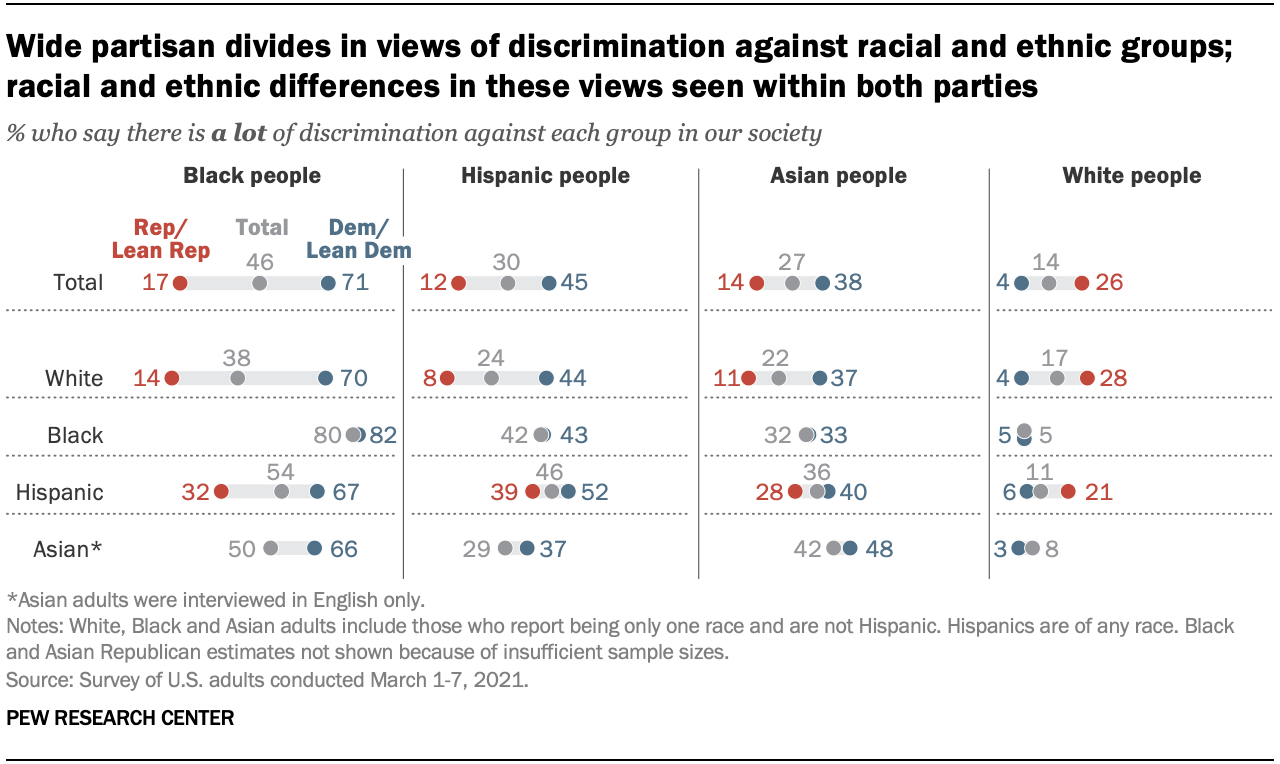
Similarly, while there is a wide partisan gap in views of whether Asian people face a lot of discrimination (38% of Democrats and 14% of Republicans say this), Asian Democrats (48%) are more likely than Hispanic (40%), White (37%) and Black (33%) Democrats to say this.
While Democrats are more likely than Republicans to say Black, Hispanic and Asian people face discrimination, Republicans are much more likely than Democrats to say that there is a lot of discrimination against White people in society today. About a quarter of Republicans (26%) say that White people face a lot of discrimination; just 4% of Democrats say this. White Republicans are 24 percentage points more likely than White Democrats to say that White people face a lot of discrimination.
Aside from racial and ethnic groups, the survey asks about discrimination against other groups in society, including gays and lesbians, women and men, Muslims, Jews and evangelical Christians.
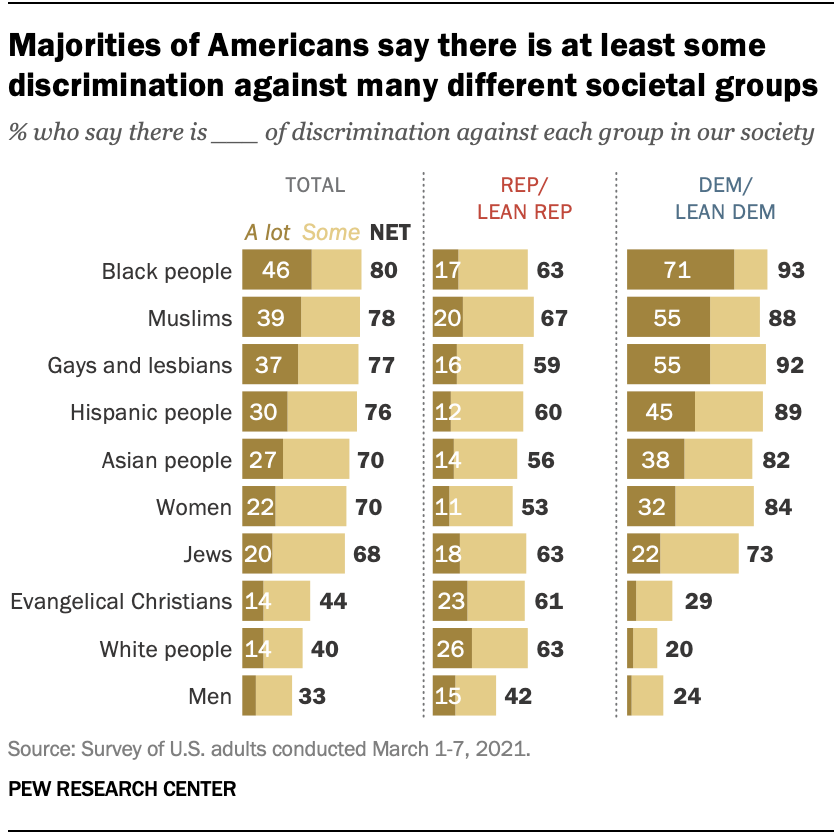
Majorities of Americans say that Muslims, Jews, gays and lesbians, and women all face at least some discrimination in today’s society, while fewer than half (44%) say that evangelical Christians face some or a lot of discrimination.
Men are viewed as facing the least discrimination among groups included in the survey, with just one-third of adults saying that men face at least some discrimination.
Similar shares – including majorities of both Republicans and Democrats – say that Muslims (78%) and gays and lesbians (77%) face at least some discrimination, with 39% saying Muslims face a lot of discrimination and 37% saying gays and lesbians do.
Two-thirds of Americans say that Jews in the U.S. face at least some discrimination, including majorities of both Republicans and Democrats. Partisans are more divided on whether evangelical Christians face substantial amounts of discrimination. Republicans are about twice as likely as Democrats to say that evangelical Christians face at least some discrimination (61% vs. 29%), and nearly one-quarter of Republicans say that evangelicals face a lot of discrimination, compared with just 6% of Democrats.
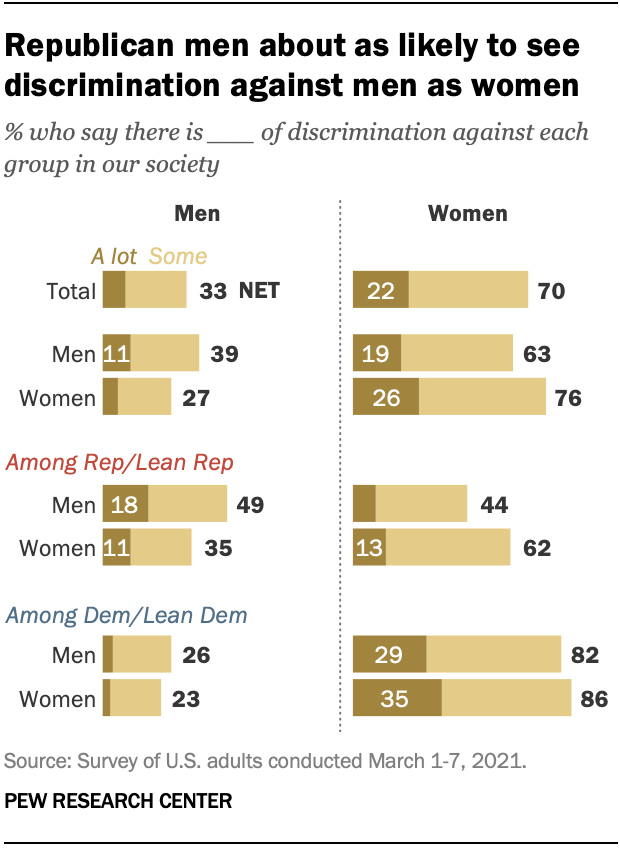
Seven-in-ten also say that women face at least some discrimination, including 22% who say women face a lot of discrimination. Democrats are much more likely than Republicans to say that women face at least some discrimination, while Republicans are more likely to see discrimination against men.
Views of discrimination against men and women differ sharply by gender, particularly among Republicans.
While majorities of both women (76%) and men (63%) say women face at least some discrimination, women are 13 percentage points more likely than men to say this. By contrast, while about four-in-ten men say men face at least some discrimination, only about a quarter (27%) of women say this.
These gender gaps are more pronounced among Republicans. About half of Republican men (49%) say that men face as least some discrimination, compared with 35% of Republican women. And while about six-in-ten Republican women (62%) say that women face at least some discrimination, fewer than half of Republican men (44%) say this.
Among Democrats, about a quarter of both men (26%) and women (23%) say that men face at least some discrimination. Similar majorities of both Democratic men (82%) and Democratic women (86%) say that women face at least some discrimination.
Note: Here are the questions used for the report, along with responses, and its methodology.